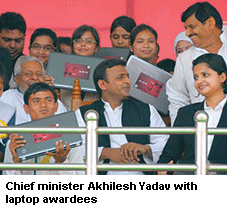Uttar Pradesh: Laptops silver lining
 Even as the legislative assembly election in Uttar Pradesh — India’s most populous (215 million) and arguably most under-governed state — is less than a year away, the auguries for the ruling professedly socialist Samajwadi Party are not good. The state is making national headlines for all the wrong reasons. In September 2013, over 52 Muslim citizens of Muzaffarnagar in Western UP were killed in a pogrom; in September 2015, Mohammed Aklaq was lynched by a riotous mob for allegedly storing beef in his refrigerator (beef consumption is a crime in this state which hosts over 30 million Muslim minority citizens); and on July 31, a family travelling by car on the Delhi-Kanpur national highway was waylaid by six robbers who gang-raped the mother and her 14-year-old daughter.
Even as the legislative assembly election in Uttar Pradesh — India’s most populous (215 million) and arguably most under-governed state — is less than a year away, the auguries for the ruling professedly socialist Samajwadi Party are not good. The state is making national headlines for all the wrong reasons. In September 2013, over 52 Muslim citizens of Muzaffarnagar in Western UP were killed in a pogrom; in September 2015, Mohammed Aklaq was lynched by a riotous mob for allegedly storing beef in his refrigerator (beef consumption is a crime in this state which hosts over 30 million Muslim minority citizens); and on July 31, a family travelling by car on the Delhi-Kanpur national highway was waylaid by six robbers who gang-raped the mother and her 14-year-old daughter.
Against the backdrop of these, among other atrocities in UP making daily headlines countrywide, a report of the Lucknow-based Giri Institute of Development Studies (GIDS, estb.1973 and supported by the Delhi-based Indian Council for Culture & Social Research) which lauds the state government’s distribution of laptops to students who pass the class X and XII board exams, is a silver lining to the dark clouds on the Samajwadi Party’s horizon.
The scheme to distribute laptops and tablets to school-leavers was initiated in 2012 to encourage students to pursue higher education. For example the eligibility criteria for class XII pass outs included admission into a college, recognised polytechnic or ITI. The free laptops scheme was one of the highlights of SP’s 2012 election campaign, and reportedly swung the youth vote in favour of the party led by its 43-year-old chief ministerial candidate Akhilesh Yadav.
Though 1.48 million laptops have been distributed under the scheme thus far, it received no budgetary support between 2013-15 after the state’s comptroller and auditor general (CAG) criticised the wastage of public funds for organising huge electoral calculus-driven jamborees for distribution of the laptops. However, the GIDS study credits it for resulting in numerous positives, from increasing social awareness of new technology learning options, to creating opportunities for self- employment. For the study, 3,200 beneficiaries from 16 colleges in 13 districts were interviewed with 86 percent of respondents stating their academic performance has improved after receiving laptops. Moreover, 53 percent of the respondents said they have become tech savvy, 21 percent claimed to have landed part-time jobs or started small enterprises with the help of technology. An interesting conclusion of the study is that almost all respondents believe they have earned family and social respect for becoming eligible to receive the laptops.
Comments Dr. Charan Singh Verma, senior fellow at GIDS and author of the study: “While there might have been a political purpose behind the scheme, its benefits cannot be overlooked. Better electricity supply, internet connectivity, training to make optimal use of the laptops etc will make this an even more potent tool to bridge the state’s digital divide and equip young people, especially in rural and semi-urban areas, to change their mindsets and embrace new information and communication technologies.”
This academic endorsement of the free laptops initiative might prompt the party leadership to rethink its plans to drop the scheme from SP’s list of poll promises for the 2017 elections, a decision prompted by the party’s dismal performance in the 2014 Lok Sabha elections where it won a mere five (out of 80) seats and the distributed laptops were reportedly used extensively in the BJP’s poll campaign.
However, distribution of free-of-charge laptops to school-leavers (which costs the state exchequer Rs.2,800 crore per year) cannot guarantee a better future in a state which despite having the country’s highest GER (gross enrolment ratio) in higher education (4.6 million according to the Annual Status of Higher Education Report, 2015), is predicted to host 10 million unemployed youth by 2017, according to the National Sample Survey, 2016.
Puja Awasthi (Lucknow)















Add comment